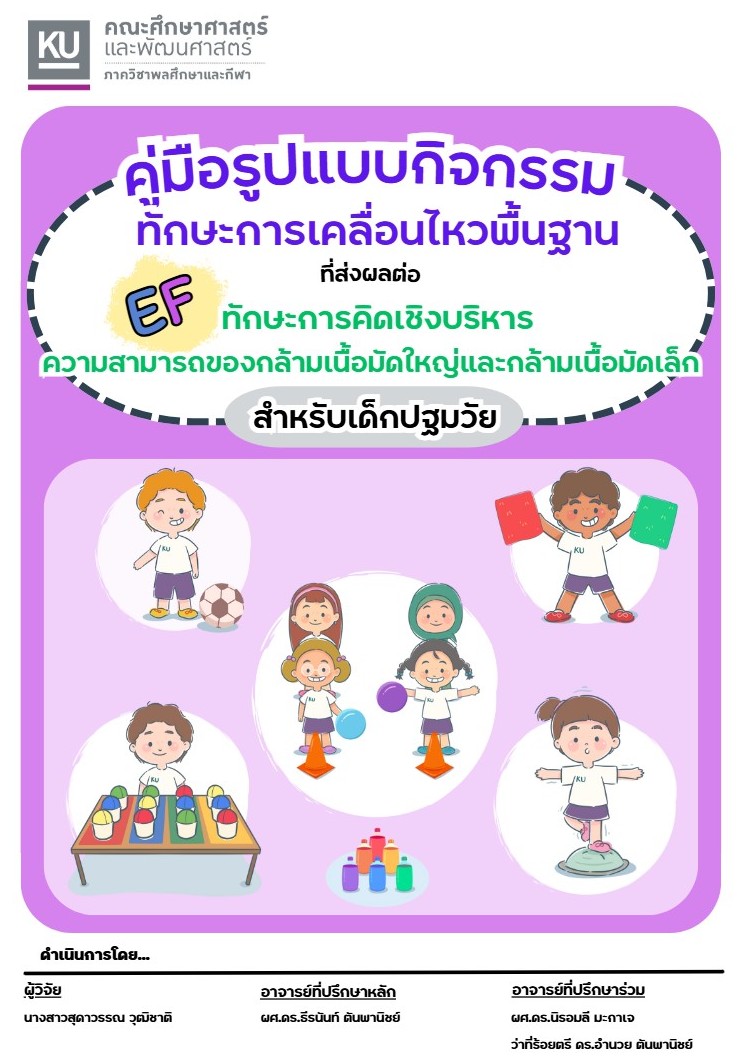การพัฒนารูปแบบกิจกรรมทักษะการเคลื่อนไหวพื้นฐานที่ส่งผลต่อการเสริมสร้างทักษะการคิดเชิงบริหารและความสามารถของกล้ามเนื้อสำหรับเด็กปฐมวัย (The development of fundamental movement skill activities to enhance executive thinking skills and muscle abilities in early childhood)
Main Article Content
Abstract
การวิจัยครั้งนี้มีวัตถุประสงค์เพื่อพัฒนารูปแบบกิจกรรมทักษะการเคลื่อนไหวพื้นฐานที่ส่งผลต่อการเสริมสร้างทักษะการคิดเชิงบริหารและความสามารถของกล้ามเนื้อสำหรับเด็กปฐมวัย เป็นการวิจัยแบบผสมผสาน มีกลุ่มเป้าหมาย 4 กลุ่ม คือ 1) ผู้เชี่ยวชาญสำหรับพัฒนารูปแบบ 15 คน 2) ผู้เชี่ยวชาญสำหรับตรวจสอบความเหมาะสมและความเป็นไปได้ของรูปแบบ 5 คน 3) ผู้ทรงคุณวุฒิสำหรับการยืนยันรูปแบบ 9 คน และ 4) ผู้เชี่ยวชาญสำหรับประเมินคุณภาพคู่มือ 5 คน โดยเลือกกลุ่มเป้าหมายแบบเจาะจง สำหรับเครื่องมือที่ใช้ในการวิจัย ประกอบด้วย แบบสัมภาษณ์เชิงลึก และแบบประเมินคุณภาพคู่มือ มีวิธีดำเนินการวิจัย 5 ขั้นตอน ดังนี้ 1) การศึกษาและสำรวจข้อมูล 2) การสัมภาษณ์ผู้เชี่ยวชาญเพื่อให้ได้รูปแบบกิจกรรมทักษะการเคลื่อนไหวพื้นฐานฯ 3) สร้างรูปแบบกิจกรรมทักษะการเคลื่อนไหวพื้นฐานฯ 4) ยืนยันรูปแบบกิจกรรมทักษะการเคลื่อนไหวพื้นฐานฯ และ 5) การจัดทำและประเมินคุณภาพรูปแบบกิจกรรมทักษะการเคลื่อนไหวพื้นฐานฯ วิเคราะห์ข้อมูลโดยใช้ค่าเฉลี่ยและส่วนเบี่ยงเบนมาตรฐาน ผลการวิจัยพบว่า รูปแบบกิจกรรมทักษะการเคลื่อนไหวพื้นฐานฯ จำนวน 18 กิจกรรม ที่ผู้วิจัยพัฒนาขึ้น ผ่านการประเมินยืนยันความเป็นไปได้ของคู่มือและรูปแบบกิจกรรมที่มีความเชื่อถือได้ มีค่าความเที่ยงตรงเชิงเนื้อหา ระหว่าง 0.80-1.00 สามารถเป็นต้นแบบให้ครูที่สอนระดับปฐมวัยนำไปใช้ในการพัฒนาและส่งเสริมการจัดกิจกรรมทักษะการเคลื่อนไหวพื้นฐานที่ส่งผลต่อการเสริมสร้างทักษะการคิดเชิงบริหารและความสามารถของกล้ามเนื้อมัดใหญ่และกล้ามเนื้อมัดเล็กสำหรับเด็กปฐมวัยได้
The research aimed to develop a model of fundamental movement skill activities that influence the enhancement of executive function and muscle abilities in early childhood. A mixed-methods approach was used with four target groups: 1) 15 experts for developing the model, 2) 5 experts for evaluating the appropriateness and feasibility of the model, 3) 9 specialists for confirming the model, and 4) 5 experts for assessing the quality of the manual. The target groups were selected purposively. The research instruments included in-depth interviews and a manual quality assessment form. The research process consisted of five steps: 1) studying and gathering information, 2) interviewing experts to obtain the fundamental movement skill activity model, 3) creating the model, 4) confirming the model, and 5) developing and evaluating the quality of the model. The data were analyzed using mean and standard deviation. The research results showed that the 18 basic movement skill activities developed by the researcher were validated and had a content validity coefficient ranging from 0.80 to 1.00. These activities are reliable and can be used as a model for early childhood educators to develop and promote fundamental movement skill activities that enhance executive function and both gross and fine motor abilities in early childhood.
Downloads
Article Details

This work is licensed under a Creative Commons Attribution-NonCommercial-NoDerivatives 4.0 International License.
References
Buayoo, S., Moungsirithum, P., & Malarat, A. (2019). Development of physical education curriculum to develop gross muscle for early childhood (การพัฒนาหลักสูตรพลศึกษาเพื่อพัฒนากล้ามเนื้อมัดใหญ่สำหรับเด็กปฐมวัย). Journal of Education Prince of Songkla University, Pattani Campus, 30(1), 85–95.
Bunsawat, P. (2001). Learning to write (เมื่อหนูน้อยหัดเขียน) (3rd ed.). Chulalongkorn University.
Choukuljaratsiri, O. (n.d.). EF Executive function: How important to the development of children? (EF Executive function สำคัญต่อพัฒนาการเด็กแต่ละช่วงวัยอย่างไร?). Manarom Hospital. https://www.manarom.com/blog/EF_Executive_Function.html
Chutabhakdikul, N. (2017). Tool development and evaluation criteria for assessment of executive function in early childhood (การพัฒนาและหาค่าเกณฑ์มาตรฐานเครื่องมือประเมินการคิดเชิงบริหารในเด็กปฐมวัย). Research Center for Neuroscience, Institute of Molecular Biosciences, Mahidol University.
Hanmethi, S., Pitaksinsuk, T., & Aramrit, P. (Eds.). (2018). A guide to developing brain skills, EF executive functions, for early childhood teachers (คู่มือพัฒนาทักษะสมอง EF Executive functions สำหรับครูปฐมวัย). Matichon.
Hengsuko, E. (2012). Physical activities for early childhood (เอกสารประกอบการสอนวิชากิจกรรมพลศึกษาสำหรับเด็กปฐมวัย). Udon Thani Rajabhat University. https://shorturl.asia/6wskP
Horadal, A. (2017). Physical development of pre-school children: Guidelines for enhancement and development (พัฒนาการด้านร่างกายของเด็กปฐมวัย : แนวคิดการส่งเสริมและพัฒนา). STOU Education Journal, 10(1), 100–112.
Intasen, S., & Seanjaiban, M. (2020). Executive functions (บทความเรื่อง Executive functions). Faculty of Medicine, Naresuan University. http://www.med.nu.ac.th/dpMed/fileKnowledge/219_2020-02-29.pdf
Kanjunda, S. (2012). A study on gross motor skills of children with severe intellectual disabilities using the motor skills training program of Special Olympic, Thailand, incorporated with physical fitness activities (การศึกษาความสามารถใช้กล้ามเนื้อใหญ่ของเด็กที่มีความบกพร่องทางสติปัญญาระดับรุนแรง จากการใช้โปรแกรมการฝึกกิจกรรมทักษะกลไกของสเปเชียลโอลิมปิคแห่งประเทศไทยร่วมกับกิจกรรมฝึกสมรรถภาพทางกาย (physical fitness)). [Master’s thesis, Srinakharinwirot University]. Srinakharinwirot University Institutional Repository. https://ir.swu.ac.th/jspui/handle/123456789/1035
Krabuanrat, C. (2015). Fundamental movement skills with brain development (ทักษะพื้นฐานการเคลื่อนไหวกับการพัฒนาสมอง). Journal of Health, Physical Education and Recreation, 41(1), 5–16.
Saisunanthararom, S., & Thanaphonganan, N. (2018). Developing a program to strengthen teacher competencies on authentic assessment of school under Secondary Educational Service Area Office 32 (การพัฒนาโปรแกรมการเสริมสร้างสมรรถนะครูด้านการวัดและประเมินผลตามสภาพจริง สำหรับสถานศึกษาในสังกัดสำนักงานเขตพื้นที่การศึกษามัธยมศึกษาเขต 32). Chophayom Journal, 29(2), 341–351.
Srisa-ard, B. (2002). An introduction to research (การวิจัยเบื้องต้น) (7th ed.). Suwiriyasan.


